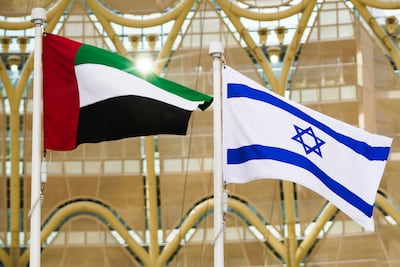The UAE and Israel have signed a customs agreement to put into effect the Comprehensive Economic Partnership Agreement (Cepa) the two countries signed in May last year.
The signing of the customs agreement will allow the UAE-Israel Cepa to enter into force and strengthen economic co-operation between the two nations, state news agency Wam reported on Monday.
The agreement was signed by Mohamed Al Khaja, the UAE ambassador to Israel, and Eli Cohen, Minister of Foreign Affairs of Israel, in the presence of Israeli Prime Minister Benjamin Netanyahu in Jerusalem.
"The Comprehensive Economic Partnership Agreement between the UAE and Israel will serve as a major engine to strengthen economic and commercial ties between the UAE and Israel. We expect the agreement to produce significant mutual economic benefits,” Mr Al Khaja said, as quoted by Wam.
The customs agreement aims to enable mutual assistance in ensuring the proper application of customs laws, accurately assessing customs and other tax fees on exports and imports, adjusting customs data, and preventing and investigating customs violations, the Wam report said.
The Cepa deal last year came after the UAE and Israel normalised relations in 2020, which led to dozens of initial pacts in sectors from aviation to technology.
Israel and the UAE began negotiations for a trade and economic co-operation deal in 2021, with talks concluding in April last year.
The Cepa deal, which is Israel's first major trade pact with an Arab nation, “builds on the strong foundations laid by the Abraham Accords”, Dr Thani Al Zeyoudi, the UAE Minister of State for Foreign Trade, had said at the time of Cepa signing last year.
Under the deal, the non-oil bilateral tariffs will be eliminated on 96 per cent of goods that generate about 99 per cent of export profits, the Ministry of Economy said. Non-oil trade volume between the UAE and Israel reached more than $2.5 billion last year, Wam reported.

With the Cepa entering into force, the UAE and Israel expect the trade volume between them to "increase significantly", it said.
The Cepa is expected to boost bilateral trade beyond $10 billion within five years and add $1.9 billion to the UAE’s gross domestic product within the same time period. Total UAE exports are expected to increase 0.5 per cent by 2030.
The UAE is working towards signing 26 Cepa deals as it seeks to attract more investment and diversify its economy, Abdulla bin Touq, Minister of Economy, said this month.
The Emirates has already signed Cepa deals with India, Indonesia, Turkey and Georgia. It is also in negotiations with Cambodia and Vietnam.


